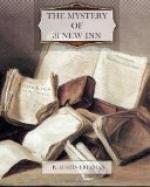“Yes. She left nothing to John. The fact is that they were hardly on speaking terms. I believe John had treated her rather badly, or, at any rate, she thought he had. Mr. Wilson, her late husband, dropped some money over an investment in connection with the bucket-shop that I spoke of, and I think she suspected John of having let him in. She may have been mistaken, but you know what ladies are when they get an idea into their heads.”
“Did you know your aunt well?”
“No; very slightly. She lived down in Devonshire and saw very little of any of us. She was a taciturn, strong-minded woman; quite unlike her brothers. She seems to have resembled her father’s family.”
“You might give me her full name.”
“Julia Elizabeth Wilson. Her husband’s name was Edmund Wilson.”
“Thank you. There is just one more point. What has happened to your uncle’s chambers in New Inn since his death?”
“They have remained shut up. As all his effects were left to me, I have taken over the tenancy for the present to avoid having them disturbed. I thought of keeping them for my own use, but I don’t think I could live in them after what I have seen.”
“You have inspected them, then?”
“Yes; I have just looked through them. I went there on the day of the inquest.”
“Now tell me: as you looked through those rooms, what kind of impression did they convey to you as to your uncle’s habits and mode of life?”
Stephen smiled apologetically. “I am afraid,” said he, “that they did not convey any particular impression in that respect. I looked into the sitting-room and saw all his old familiar household gods, and then I went into the bedroom and saw the impression on the bed where his corpse had lain; and that gave me such a sensation of horror that I came away at once.”
“But the appearance of the rooms must have conveyed something to your mind,” Thorndyke urged.
“I am afraid it did not. You see, I have not your analytical eye. But perhaps you would like to look through them yourself? If you would, pray do so. They are my chambers now.”
“I think I should like to glance round them,” Thorndyke replied.
“Very well,” said Stephen. “I will give you my card now, and I will look in at the lodge presently and tell the porter to hand you the key whenever you like to look over the rooms.”
He took a card from his case, and, having written a few lines on it, handed it to Thorndyke.
“It is very good of you,” he said, “to take so much trouble. Like Mr. Marchmont, I have no expectation of any result from your efforts, but I am very grateful to you, all the same, for going into the case so thoroughly. I suppose you don’t see any possibility of upsetting that will—if I may ask the question?”
“At present,” replied Thorndyke, “I do not. But until I have carefully weighed every fact connected with the case—whether it seems to have any bearing or not—I shall refrain from expressing, or even entertaining, an opinion either way.”




